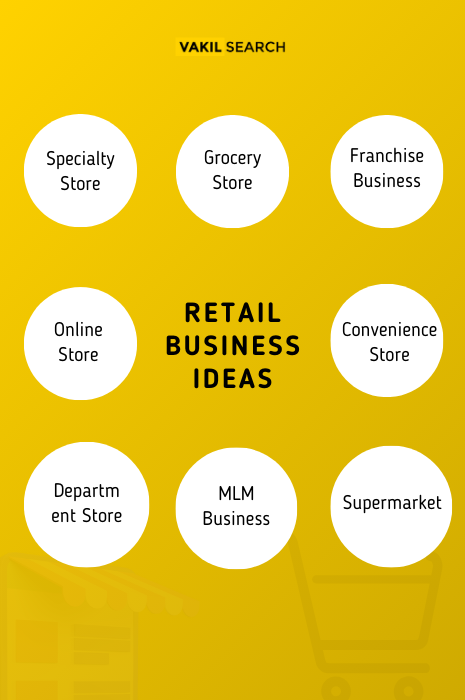Get a complete guide on essential steps and considerations for aspiring online retailers. Know how to establish a profitable a e-commerce business in 2023
Retail Business in India
The retail business in India is one of the largest and fastest-growing sectors in the economy. It accounts for about 10% of India’s GDP and employs over 40 million people. The retail sector is expected to grow at a CAGR of 10% over the next five years.
Types of Retail Business
There are many different types of retail sectors, including:
- Brick-and-mortar stores
- Online stores
- Multi-channel retailers
- Franchise businesses
- Multi-level marketing (MLM) businesses
Retail Business Ideas

Here are some retail business ideas in India:
- Grocery store
- Convenience store
- Supermarket
- Department store
- Specialty store (e.g., clothing, electronics, furniture, etc.)
- Online store
- Franchise business
- Multi-level marketing (MLM) business
Advantages of Starting A Retail Business In India
There are many advantages to starting a retail sector in India, including:
- Large and growing population
- Rising disposable incomes
- Increasing urbanization
- Growing demand for consumer goods
- Government support for the retail sector
How to Start a Retail Business in India?
To start a retail business in India, you will need to:
- Create a retail business plan. This should include your business goals, strategies, and financial projections.
- Choose your legal structure. You can choose to operate as a sole proprietorship, partnership, limited liability company (LLC), or private limited company.
- Register your company. The process for registering a company varies depending on the legal structure you choose. However, you can usually register your company online or through a chartered accountant.
- Name your business. Your business name should be unique, memorable, and relevant to your industry.
- File for an Employer Identification Number (EIN). An EIN is a nine-digit number that is used to identify your business for tax purposes. You can file for an EIN online or by mail.
- Understand other business laws. There are a number of laws and regulations that govern retail sectors in India. You should make sure that you are familiar with all of the relevant laws and regulations before you start your business.
- Get all necessary licenses. Depending on the type of retail sector you are starting, you may need to obtain certain licenses and permits. For example, you may need a food safety license if you are starting a food retail business.
- Pick a location and make your store attractive. The location of your store is very important. You should choose a location that is highly visible and convenient for your target customers. You should also make sure that your store is attractive and inviting.
- Find suppliers. You will need to find reliable suppliers who can provide you with the products you need at competitive prices.
- Find your inventory. You will need to decide which products you want to sell and how much inventory you need.
- Market your business. Once you have everything set up, you need to start marketing your business. You can market your business through a variety of channels, such as advertising, social media, and public relations.

Things to Consider For Starting a Retail Business in India
There are a few things you need to consider before starting a retail sector in India, such as:
- The type of retail sector you want to start
- The location of your store
- Your target market
- Your competition
- The legal and regulatory requirements
- The financial requirements
Registrations Required for a Retail Industry
The registrations required for a retail industry in India vary depending on the legal structure you choose. However, some of the common registrations required include:
- GST registration
- Shop and Establishment Act registration
- Fire safety certificate
- Food safety license (if applicable)
Importance of the Retail Industry
The retail industry is very important to the Indian economy. It accounts for a significant portion of GDP and employment. The retail industry also plays a vital role in distributing goods and services to consumers.
Is Retailing a Profitable Business?
What are the 3 R's of retail?
The 3 R's of retail typically refer to the following principles:
- Right Product: Retailers must offer the right products that align with customer preferences and demand.
- Right Place: Products should be available in the right locations or stores where customers are likely to shop.
- Right Price: Products should be priced competitively and in a way that attracts and retains customers.
- These principles emphasize the importance of product selection, store location, and pricing strategy in the retail industry.
Do I need any special permissions or licenses to start a retail business in India?
Yes, you may need specific permissions and licenses to start a retail business in India. The requirements can vary depending on the type of retail business, location, and the products or services you intend to sell.
Common licenses and permits for retail businesses in India may include
- Registration of company online: Register your business entity, such as a sole proprietorship, partnership, private limited company, or others, as per legal requirements.
- Shop and Establishment License: Obtain a shop and establishment license from the local municipal authority.
- GST Registration: Register for Goods and Services Tax (GST) if your annual turnover exceeds the prescribed threshold.
- Fire Safety Certificate: Ensure compliance with fire safety regulations and obtain the necessary certificates.
- Health License: If your retail business deals with food, beverages, or health-related products, you may need health and hygiene licenses.
- Local Permits: Depending on the location and specific activities, you may need additional permits from local authorities.It's essential to research and consult with local authorities and legal experts to determine the specific licenses and permissions required for your retail business.
What is the purpose of a retail business?
The primary purpose of a retail business is to provide goods and services directly to consumers. Retailers act as intermediaries between manufacturers or wholesalers and end consumers, making products available, convenient to purchase, and accessible. Retail businesses aim to meet consumer needs and preferences, generate sales, and earn a profit.
What type of business is a retail business?
A retail business is a type of business that sells goods and services directly to consumers. It is part of the distribution chain, with products moving from manufacturers or wholesalers to retailers and then to end customers. Retail businesses can take various forms, including brick-and-mortar stores, e-commerce websites, pop-up shops, and more.
How much money will I need to start my retail business in India?
The amount of money needed to start a retail business in India can vary widely based on factors such as the type of retail store, location, scale, and the products or services you plan to offer. Costs may include rent or lease expenses, inventory procurement, store setup, marketing, and working capital. Small retail businesses may start with a few lakhs of rupees, while larger and more elaborate setups can require several crores or more in investment. It's crucial to create a detailed business plan and financial projection to determine your specific startup costs.
How much profit should a retail store make?
The profit margin of a retail store can vary significantly based on factors such as the type of retail business, industry standards, location, and competition. Profit margins in retail typically range from 2% to 10% or more. However, there is no fixed percentage that every retail store should aim for, as it depends on various factors and the specific business model.




